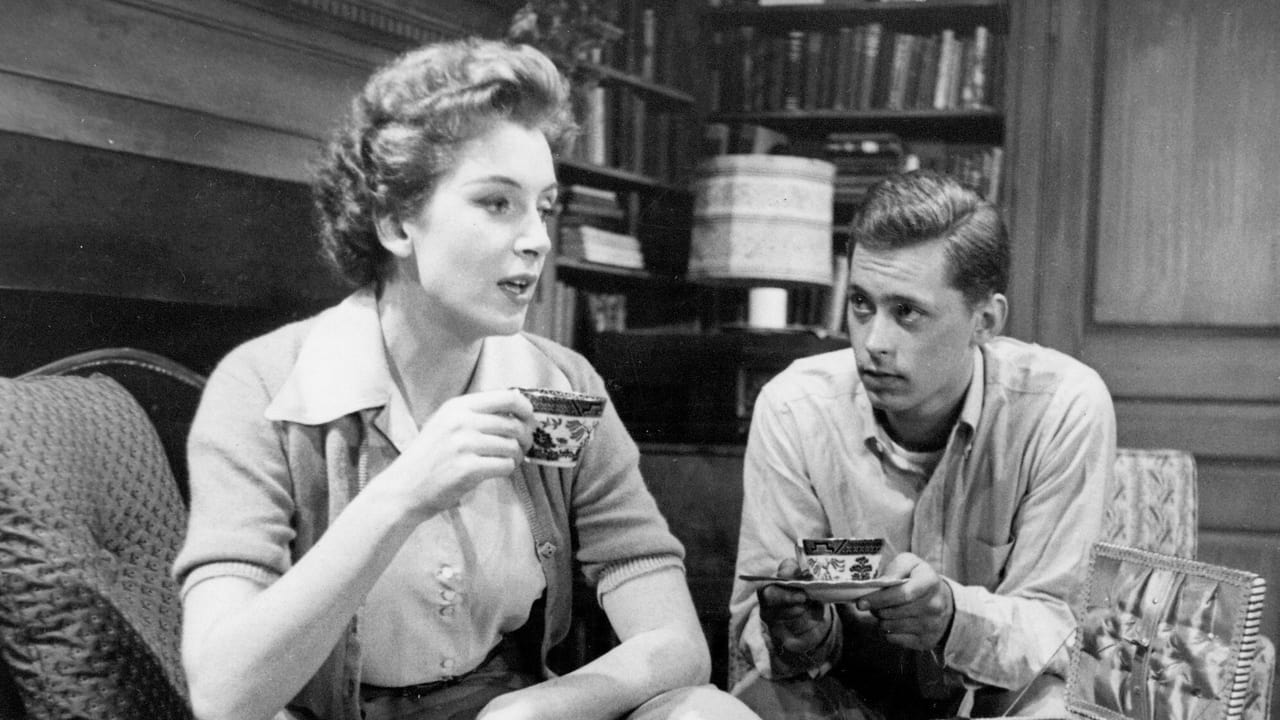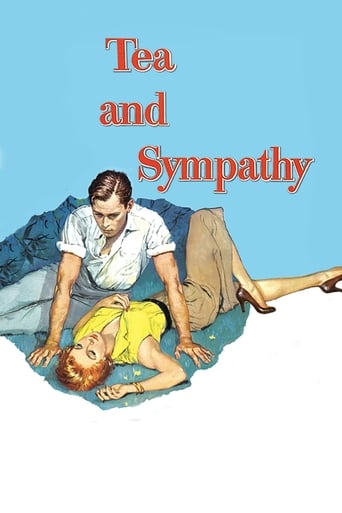

Lack of good storyline.
... View Moregood back-story, and good acting
... View MoreAdmirable film.
... View MoreThere are moments that feel comical, some horrific, and some downright inspiring but the tonal shifts hardly matter as the end results come to a film that's perfect for this time.
... View MoreMiss Kerr's cold archness, as always, makes grace Kelly or Maureen O'Hara look like Marlene Dietrich in comparison, and the young Kerr lad is unwatchable. I found the merest hints at the coach's homosexuality incredibly hot and would have loved to see the play's original version here. woof! and I don't think the son's father gets away with a fully str8 Kinsey rating either. do his father and the coach have history? :) And to Matthew's comment above: "His avoidance of close-ups reveals him to be, in this case at least, what feels to me like a very selfish director. "Quite simply, Cinemascope is "not kind" to closeups.
... View MoreThere's some touching and unintentionally amusing material here. Deborah Kerr is the sensitive mistress of a boarding house for a couple of college kids, and the wife of bluff Lief Erickson, headmaster. One of the kids who lives upstairs is John Kerr. She's not only nurturant, she's gorgeous too, despite the lurid period make up.Kerr is the odd kid out. He doesn't walk like a man. He was taught to sew by his maid after his mother's death. He has long hair instead of the ubiquitous crew cuts. He doesn't know any girls. He doesn't know how to dance. He has no interest in making a fortune after he graduates. He listens to classical music and wants to become a folk singer. He reads "poetry" off by himself. He wins at tennis but not by forceful drives but by chops and slices. At one point, his father, Edward Andrews, visits the campus and asks his old friend Erickson how Kerr is making out. Erickson lowers his face and forces himself to reveal all: "He was found on the beach with the faculty wives -- SEWING." Deborah Kerr observes all this and can't keep herself from interfering, although the rules declare that she must do nothing more than provide "tea and sympathy" to the boys on Sundays.D. Kerr goes much farther than that to help the wounded J. Kerr. She begs J. Kerr's empathic but helpless room mate to give him lessons on masculinity. She argues with her husband over the rough treatment, begs him to see that it stops. He's compelled to refuse. Maybe some rough treatment will make a man of J. Kerr.Well, all of this is mighty dated. First of all, J. Kerr is not merely "out of step" with the others, which is all the movie script implies. He's a homosexual dressed in the moral code of the time. Second of all, all those buzz-cut jock types playing grabass on the beach and bragging about their conquests are stand-ins for the attitudes that some felt the nations of the Free World should take towards the Collectivists behind the Iron Curtain. Treat 'em rough and maybe it will teach 'em a lesson. Most forcefully, and most generally, this is a critique of the very real enforced conformity of the 1950s which the Beatniks finally challenged publicly.The stereotypes abound. Not in real life. I doubt that in the 1950s, or maybe EVER, was the gender structure of campus life ever so bifurcated, except maybe in some isolated and selective settings. The stereotypes represent, not verisimilitude, but the intention of the screenwriter, Robert Anderson, to simplify our vision of life so that our choices are made more easily. In this case, both of the Kerrs are right and everyone else is wrong. There now. Wasn't that easy? At times the script becomes almost hilarious, a self parody. The boys alternately shun and humiliate J. Kerr. They call him "Sissy Boy." But D. Kerr knows better. If he has grave doubts about his own masculinity, she solves the problem by seducing him in a furry glade. Thus, she "cures" him of his homosexual disease.What I'd have loved in that tender scene is to see it go beyond the point at which the beautiful and liminally sexual D. Kerr slips off her sweater, gently clasps J. Kerr's face to her bosom, and says, "When you talk about this in later years -- and you will -- be kind." First of all, I'd like to have seen a little more eagerness on the part of the neglected, love-starved wife, more than just the desire to help someone else. After all, she thinks he's an ithyphallic eighteen-year-old stud-in-waiting. I'd have loved to see a graphic sexual scene in which J. Kerr turns out to be completely impotent despite the most ardent ministrations of D. Kerr. I'd have liked seeing J. Kerr disgusted throughout the ordeal. And finally he should have stood up, buttoned his clothes, and spat out an insult, "Keep your filthy hands off me from now on, you witch. If you want to talk to me in the future, I'll be at Shelley's making focaccio. And -- by the way -- that DRESS you're wearing is a complete CATASTROPHE." Her husband, playing rough house with the boys out on the gridiron, should suffer an injury that causes him to lose one of his testicles. J. Kerr's room mate, the one bulging with muscles, the one with a neck the width of a utility pole, should be found in the bathroom stall with a muscle man magazine in his lap. The captain of the football squad needs have his closet full of ladies' shoes revealed.That would have provided a perfect ending to a movie that now, from our current enlightened, sophisticated, liberated, and thoroughly corrupt perspective, we can recognize for the comic enterprise that it is.
... View MoreRobert Anderson adapted his own play for the screen about a sensitive young man ostracized at his all-male school for pursuing interests not typically associated with red-blooded males circa 1950. Seems he enjoys cooking and sewing, singing folk music, and chatting with the faculty wives--all of which have alienated him from his classmates (as well as his own father!), though not the lonesome wife of the head schoolmaster, who takes a special and heartfelt interest in the lad. As played by John Kerr (reprising his stage performance), the central character is curiously presented without even the slightest hint of affectation; yes, he shows no resistance to playing a female role in the class play (requiring him to wear a flouncy dress), yet the filmmakers want us to see something in this boy which isn't standard, and John Kerr is incredibly, blandly standard (even his walk, which is mocked, is utterly ordinary). Ironically, though the film has a dated viewpoint of masculinity--the opposite of which is practically labeled 'abnormal'--the picture has a large following among gays. Though it is a serious-minded movie, one is apt to hoot in derision at the script's loftier passages. Thankfully, Deborah Kerr also reprises her stage role as Mrs. Reynolds, and she pulls out whatever honesty there is in the dialogue and actually gives it some depth and worth. The theme here is certainly an unusual one for 1956 Hollywood--and even stranger for having Vincente Minnelli direct it, he the subject of much gossip himself--but the production is plush and the story is engrossing despite the soapy undermining. **1/2 from ****
... View MoreThere should be a genre for films like Tea and Sympathy, Suddenly Last Summer, and Cat on a Hot Tin Roof. It could be called "Back When It Was a Disease" or "Homosexuality According to the 1950s." This is a film about a sensitive schoolboy (Tom) who just can't jive with the manly jocks he is expected to befriend. In fact, he prefers to discuss poetry with a middle aged, Technicolor-coordinated, Deborah Kerr (Laura). Based on a play, the film is watered down considerably to avoid addressing the issue of his homosexuality outright. For instance, a scene in which the boy is caught skinny-dipping with a flamboyant professor is totally removed. It is very mildly laughable (or maybe half-heartedly chuckle- able) to see Tom learning to walk like a man, so angst-ridden about his status as a "sissy," especially when even he thinks he just needs someone to quell the confusion.The film is about hate and discrimination and, I think, we are meant to sympathize with Tom, but only because he is branded a "queer" by his peers without the sympathy that the Kerr character is able to dish out, and thus "cure" him. In the 1950s, homosexuality was considered a disease by the psychiatric powers-that-be. And as many diseases can be cured, so could this one in the perverse imagination of the Hollywood censors. The Kerr character martyrs herself, sacrificing her virtue to shag the boy (who really is a boy of only 17), which effectively rids him of his "illness." Yes, his confusion vanishes instantly as Laura unbuttons her cardigan with a disturbingly sober expression that was obviously meant to say "I am not doing this out of lust, but out of my older, wiser, nurturing feminine duty to rescue you from this unholy perversion." And then he grows up into a self-assured, suit-wearing, happily married, home-owning go-getter. Thank God, for martyrs like Laura. What's most jacked up about Tea and Sympathy is that it seems to want to function as a shout-out to all the idiosyncratic so called sissies that are so unfortunately stigmatized for being different. Which would be fine, except that the film is telling its audience that it is okay to be different because, hooray, there's a cure. In other words, it's not okay to be different. The cruel peers who ostracize "sissies" like Tom are not okay either. But only because Tom could still grow up to epitomize het-masculine normalcy. Tea and Sympathy reprimands its homophobes for punishing innocent soon-to-be ex-gays as if to say, "please do be careful when punishing the gays because they might not always be that way. And when they're good and cured, boy, will there be some red faces all around." But my biggest problem is this: for a movie that's so sooo soooooo backwards, it is not nearly funny enough. Cat on a Hot Tin Roof was funny. Suddenly Last Summer was even funnier yet. Okay, Kerr's seduction scene, though nightmarish, was funny. I'll give it 5/10 stars just for that, but otherwise, and I know it has its fans, Tea and Sympathy just kind of sits there for me. Sure, it's interesting to talk about from a historical perspective. But standing alone, it's like an antiquated high school textbook.
... View More